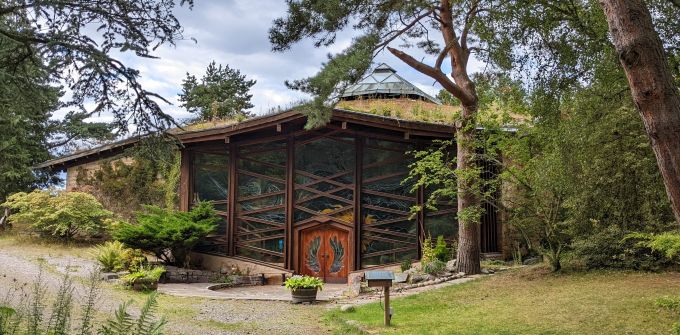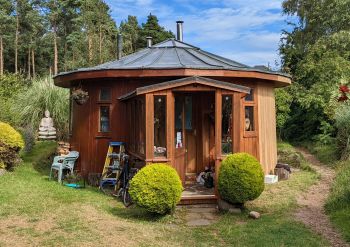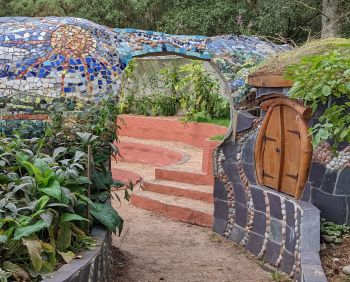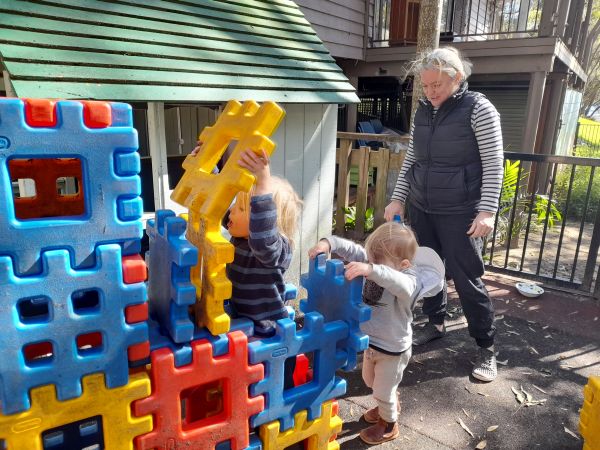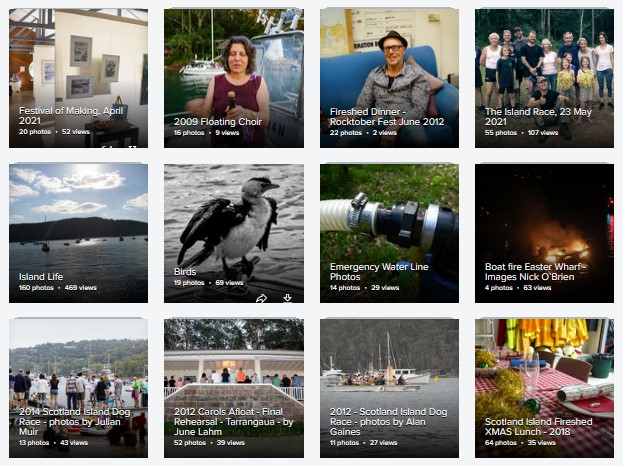| SHaving trouble reading this newsletter? Visit https://ymlp.com/archive_gesgjgm.php | |||||||||||||||
 |
|||||||||||||||
September 1, 2022 |
|||||||||||||||
|
Newsletter for the
Offshore Residents of Pittwater, Australia - Volume 23,
Issue 1185
We acknowledge and pay our
respects to the Traditional Custodians of
Pittwater, as well as our Indigenous readers
|
|||||||||||||||
ContentsReflections from FindhornRoy Baker
There are many kinds of community, but the concept of an ‘intentional community’ is an especially curious one. Intentionality is not the same as the exercise of free choice, so while most of us live offshore intentionally, in the sense that we didn’t sleepwalk here, we may feel that Sydney’s housing market left us with no real option. But the term ‘intentional’ usually denotes a community designed from the outset for a high degree of social cohesion and teamwork.
There was, of course, a lot more to it than that. But it was talk of 20 kilo vegetables that attracted the media and, in turn, hordes of 1960s hippies. The community that grew up around those cabbages remains to this day, the product of that eclectic and esoteric mix of occultism, ecology and communitarianism generally labelled ‘New Age’. My feelings around this social phenomenon have always been ambivalent. At the age of 26 I was sufficiently interested to undergo ‘Experience Week’ at Findhorn, during which I was told, assuredly, about the fairies that live inside computers. And that was when I wasn’t having someone reflect my personality back to me through dance. It’s easy to scoff. But when you see the warmth with which Findhorn residents interact, their devotion to environmentalism and their commitment to (and considerable success in) communal living, it’s hard not to conclude that they are on to something.
There was a lot of talk of received guidance and providence, and the community’s founders are treated with almost messianic reverence. ‘Could an atheist live here?’ I asked. ‘Oh, we have plenty of those’, I was told. Even so, I felt resistance to the constant preferencing of intuition over intellect. I voiced my concerns, and my guide asked me whether I was at least comfortable with the idea of listening to my inner voice. And at that, as a man who lives far too much in his head and not enough in my heart, the tears came. There is so much laudable about Findhorn, and I see elements of the same in our offshore communities. For instance, we have the dogged devotion to community that keeps our fire brigades and residents’ associations functioning. We find our bush care groups committed to their thankless tasks. And we have our monthly dances and cafés. Mind you, Findhorn has weekly dance sessions and its café operates daily. Not bad, considering that Findhorn’s population reaches only 400, compared with 700 for Scotland Island.
This year Colin Haskell, after a considerable term as SIRA president, wishes to step down. Colin has done well, and we thank him. Now the search for a fitting replacement begins. SIRA has a Strategy and Vision sub-committee, which asks us to consider our vision for the island. Sometimes such questions can appear effete among more concrete issues like roads and drainage. But perhaps Findhorn teaches us otherwise. One day, sitting in Findhorn’s café, I noticed how I was surrounded by smiling and chatty neighbours. I felt love. And, strangely, I felt at home. There’s a touch of Findhorn around Pittwater. Perhaps, with shared vision, we can emulate even more of Findhorn’s commitment to the environment and community. Even though, I suspect, our cabbages are going to remain pretty ordinary.  Mick Miller: 'The Right Path'A guide to life's journeyRoy Baker 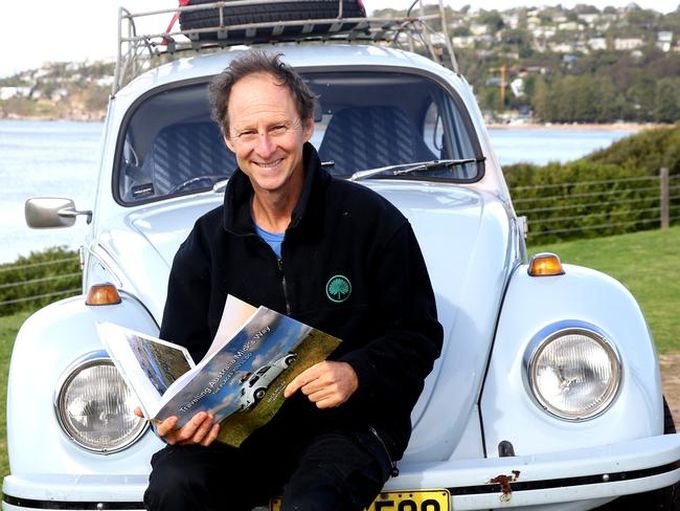 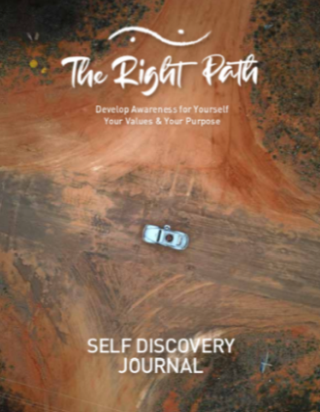 Mick arrived in
Australia at the age of seven, but grew up among the
Pittwater offshore community. In his early adulthood he
enjoyed success as an Olympic strength and performance
coach. But in 2013, just before his 50th birthday, he
discovered a lump in his neck that turned out to be
cancer. Mick arrived in
Australia at the age of seven, but grew up among the
Pittwater offshore community. In his early adulthood he
enjoyed success as an Olympic strength and performance
coach. But in 2013, just before his 50th birthday, he
discovered a lump in his neck that turned out to be
cancer. This, he feels, was the beginning of a journey towards re-evaluating everything in his life. It also resulted in a 16-month road trip around Australia in a 1968 VW Beetle, described in his first book, Travelling Australia Mick's Way. During this journey of self-realisation, Mick found it helpful to keep monthly notes, recording his strengths, weaknesses, aspirations and needs. With these in mind he then decided on the 'authentic actions' he needed to take in the next month to keep his life on track. After several months, Mick noticed that this process was forming a 'drivers manual' for a better existence. Mick's new book, The Right Path, supports us in taking the same approach to our lives. To buy the book, or to discover more about Mick's work, click here. The book is also available for purchase in some local bookshops.  Scotland Island PlaygroupCatherine Park & the Recreation CentreTuesdays, 9:30 - 12 noon
Come Play with Us!
Parents, grandparents and their little folk are welcome to join our Scotland Island playgroup. We usually start around Tennis Court wharf Tuesday mornings and end up at the Recreation Club playground. Come along and keep the spirit of the kindy alive with the sound of children playing! If you are interested, please get in touch so that we can meet up. Remember that the Rec Club play area was created and recreated several times by parents and funding. It's a really great asset and we need to look after it. Please note that the shed that houses the play equipment is missing a panel and is therefore open. If you have older children who go to the park by themselves, please explain to them that they are very welcome to play in the play area, but they shouldn't go into the shed and take more stuff out: there's enough equipment out permanently to have fun with. Jenny Cullen 0406 806 648  Table TennisScotland Island Recreation CentreMost Saturdays throughout the year2 - 3 pm: Introduction to Table Tennis3 - 5 pm: Table Tennis practice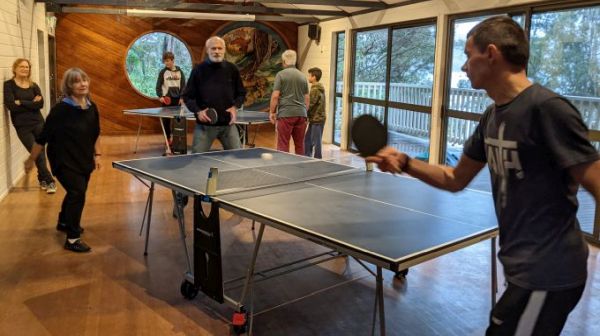 Groups meet most Saturdays
and anyone over 12 is welcome. Sessions are supported by
the Scotland Island Recreation Club.
Play from 2 - 3 pm is
intended primarily for those new to table tennis. The
session from 3 - 5 pm is open to everyone, regardless of
your standard of play.
Sessions do not run every Saturday. If you are interested in taking part then it's best to join the table tennis WhatsApp group to receive up-to-date information on who is playing. If you would like to join the group, please email editor@scotlandisland.org.au. Alternatively, you can just turn up and take your chances. Adult players are asked to contribute $5 per player per attendance to defray expenses.  Live Music Trivia QuizScotland Island Community HallSunday 4 September, 2:00 - 4:30 pm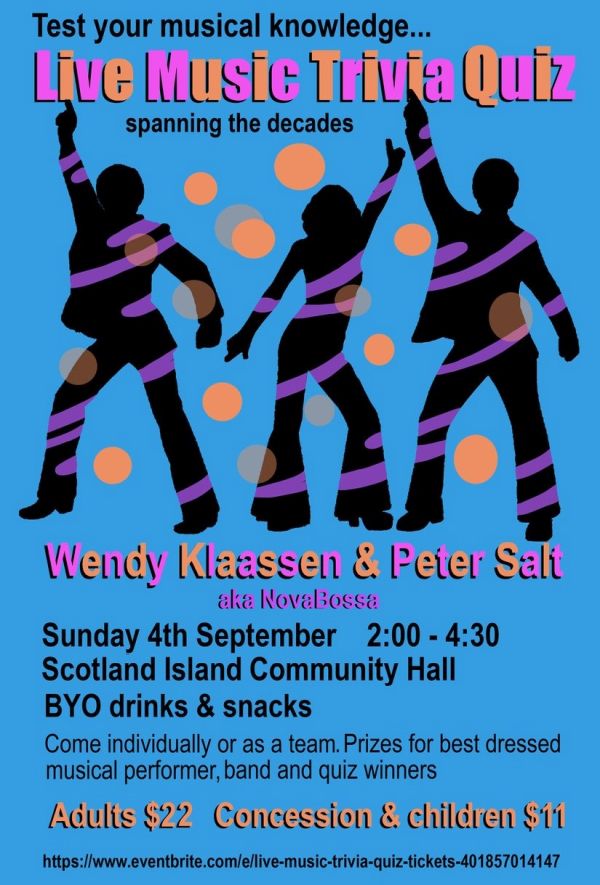 To book tickets, click
here.
The Tuesday Discussion GroupScotland Island Recreation CentreTuesday 20 September, 11 am - 12.30 pmThe Recreation Club runs a discussion group, meeting on
the third Tuesday of each month, from 11 am to 12.30 pm
in the Recreation Centre. Everyone is welcome. Members take it in turn to design a session, choosing material for discussion. This can consist of essays, articles or podcasts, or a combination of all three. The idea is that group members shouldn't be committed to more than a few hours' preparation in terms of listening or reading. The idea is to be open to a wide range of topics and material. In August Tim Turpin led a discussion on our collective sense of nostalgia, and the extent to which it shapes our national identity, as well as social and political action.
For the September meeting, Robyn Armsworth-Brack
will lead a discussion on philanthropy. We might
praise those who give generously, but is there another
side to philanthropy, and how does it sit alongside
democracy? Who really benefits: the donor or the
recipient? Preparation: Read 'The Problem with Philanthropy' by Sally Haslanger, The New Statesman, 16 October 2020, available here. Listen to 'Australia's Flawed Philanthropy', Big Ideas, ABC Radio National, tx 11 Jul 2014, available here. Listen to 'The Dark Side of Philanthropy', Big Ideas, ABC Radio National, tx 27 Apr 2016, available here. The group operates via a WhatsApp group, which will be used to distribute further information about this and future discussions.If you would like to be added to the group, please provide your mobile phone number to editor@scotlandisland.org.au. Alternatively, contact Jane Rich (janebalmain@hotmail.com) for more information or to express your interest in participating.  International Folk DancingScotland Island Community HallSaturday 24 September, 7 - 9 pm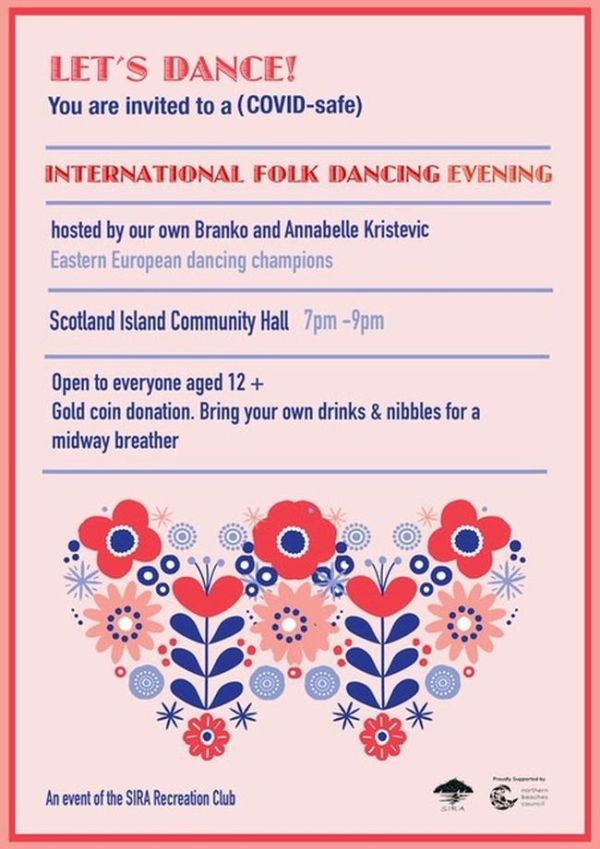 The Recreation Club
asks for $5 per person per attendance to defray
expenses.
Scotland Island CaféCatherine Park, Scotland IslandSunday 25 September, 10 - 12 noon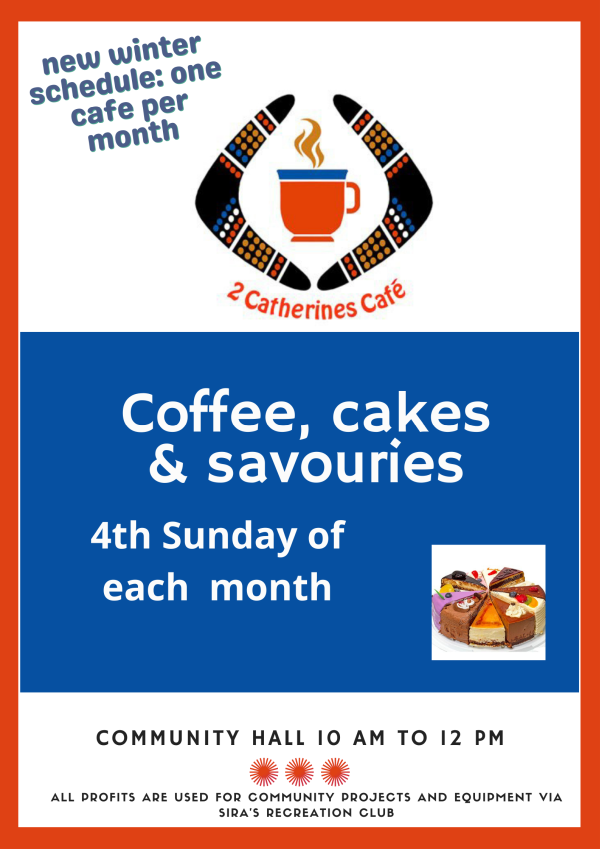 'The Authentic You' MasterclassScotland Island5 & 6 NovemberA two-day masterclass
like no other.
Mandy Nolan (comedian, author, journalist) & Dr George Catsi (award-winning writer and academic) are coming to the Island! 'Your life is a collection of unique stories. Bring storytelling into all your communications.' Sold-out events across Australia: Limited numbers. 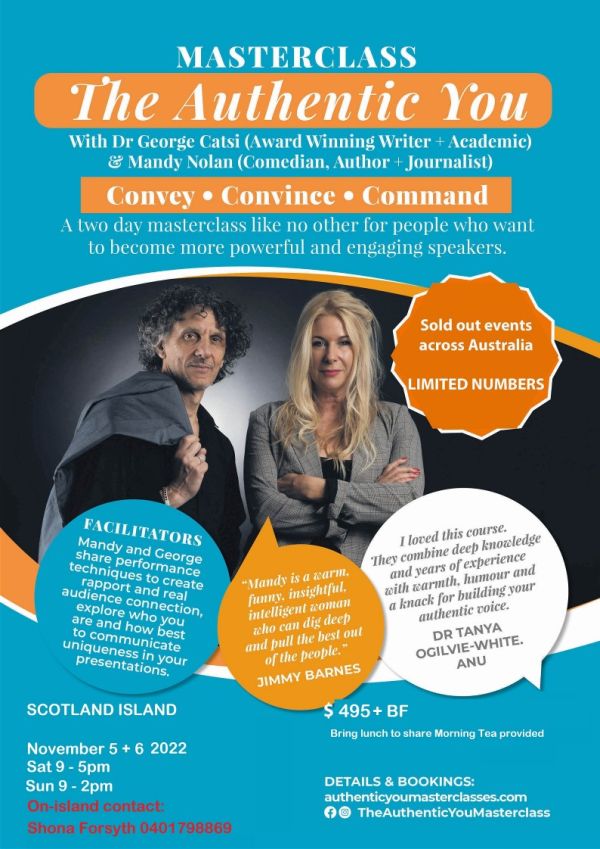 Christmas MarketCatherine Park, Scotland IslandSunday 27 November, 10 - 1 pm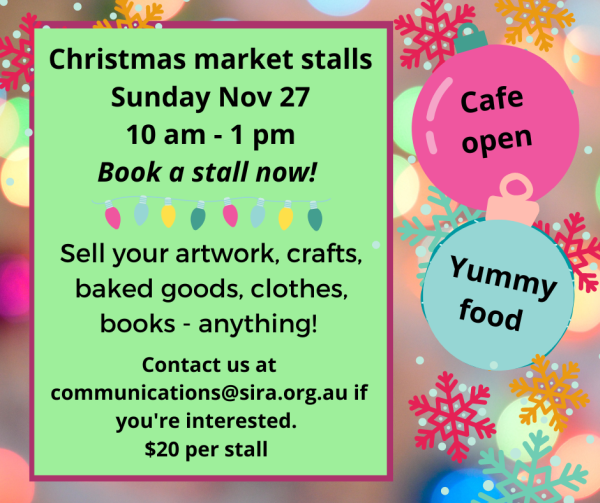 Prospective
storeholders, click here.
Missed out on a previous newsletter? Past newsletters,
beginning May 2000, can be found and read at https://ymlp.com/archive_gesgjgm.php.
To ContributeIf you would like to contribute to this newsletter, please send an e-mail to the editor (editor@scotlandisland.org.au).Subscription InformationTo subscribe or unsubscribe, go to: http://www.scotlandisland.org.au/signup.
The Online Local Contacts GuideClick HERE to loadSIRA Photo Archive |
|||||||||||||||
 |
